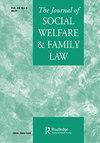诈骗消失的离奇案件
IF 0.9
Q2 LAW
引用次数: 0
摘要
摘要本案审查对Cohen J在Goddard Watts诉Goddard Watts案【2022】EWHC 711(Fam)中的判决提出了批评,该判决是对妻子离婚经济救济申请的第二次重审。最基本的批评是科恩·J将丈夫欺诈性地不披露某些股票价值大幅上涨的行为降至最低,这使得重新审理成为必要。我认为,法官没有考虑丈夫的不披露是否破坏了最初下达同意令的基础:丈夫获得了一半以上的资本,这主要是基于与股票相关的风险,而这些风险显然已经得到了回报。法官也没有考虑到,在第一次重审中,关于股票价值的增加是由于丈夫在分居后的努力,这一决定是否因他没有披露增加的规模而受到损害。我批评法官对妻子做出基于需求的裁决,认为这将焦点转移到了妻子身上,进一步掩盖了丈夫的欺骗行为。转向需求可以让法官退到安全地带,在那里他可以避免关于丈夫欺诈对他抵制与妻子分享财富的能力的影响的棘手问题。本文章由计算机程序翻译,如有差异,请以英文原文为准。
The curious case of the vanishing fraud
ABSTRACT This case review critiques Cohen J’s judgment in Goddard-Watts v Goddard-Watts [2022] EWHC 711 (Fam), a second rehearing of the wife’s application for financial remedies on divorce. The foundational critique is Cohen J’s minimisation of the husband’s fraudulent non-disclosure of a massive increase in the value of some shares, which had necessitated the rehearing. I argue that the judge failed to consider whether the husband’s non-disclosure had undermined the basis on which the original consent order had been made: the husband had received more than half of the capital based largely on the risk associated with the shares, which had clearly paid off. The judge also failed to consider whether the decision in the first rehearing that the increase in the value of the shares was attributable to the husband’s post-separation endeavour was undermined by his failure to disclose the size of the increase. I critique the judge for making a needs-based award to the wife, arguing that this switches focus to the wife, further obscuring the husband’s deceit. Switching to needs allows the judge to retreat to safe ground where he can avoid difficult questions about the impact of the husband’s fraud on his ability to resist sharing his wealth with the wife.
求助全文
通过发布文献求助,成功后即可免费获取论文全文。
去求助
来源期刊
CiteScore
2.00
自引率
13.30%
发文量
52
期刊介绍:
The Journal of Social Welfare & Family Law is concerned with social and family law and policy in a UK, European and international context. The policy of the Editors and of the Editorial Board is to provide an interdisciplinary forum to which academics and professionals working in the social welfare and related fields may turn for guidance, comment and informed debate. Features: •Articles •Cases •European Section •Current Development •Ombudsman"s Section •Book Reviews

 求助内容:
求助内容: 应助结果提醒方式:
应助结果提醒方式:


